Rethinking Parasites, Ivermectin, and Cancer
The Hidden Toxic Load and Inflammation Connection
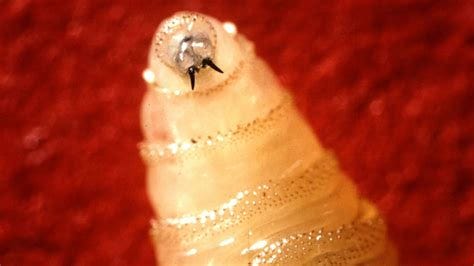
The conventional view often frames parasites as the instigators of disease, particularly in cancers linked to chronic inflammation. However, a deeper exploration into the mechanisms at play suggests that parasites may not be the culprits after all. Instead, they might be playing a secondary role in an already inflamed, toxic environment.

As we challenge the narrative that parasites directly cause cancer, it's also important to take a closer look at the impact of treatments like ivermectin—often used to target parasitic infections—and how it may temporarily alter the body's inflammation dynamics.

Could it be that the Mazzotti effect (reaction), associated with ivermectin treatment, is actually a reaction to the massive release of toxins from killed parasites, rather than a direct result of parasite eradication? Let’s dive deeper into this complex web of interactions.
The Mazzotti Effect: A Toxic Release from Parasites
When ivermectin is used to treat parasitic infections, one of the known side effects is the Mazzotti effect. This phenomenon occurs when parasites are killed too quickly, causing a dramatic release of toxins into the bloodstream. These toxins—typically from the parasite’s metabolic waste and from dying parasites—can overwhelm the body, leading to acute inflammation, fever, and even more serious reactions like hypotension or organ dysfunction.
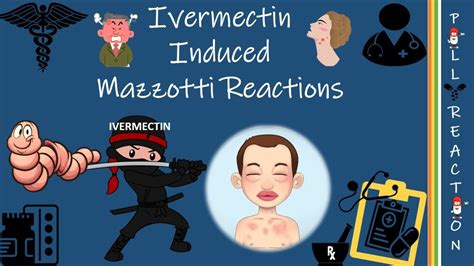
But here’s the twist: what if the Mazzotti effect isn't simply the result of an immune system "overreaction" to dying parasites, but rather a reaction to the massive toxic load parasites release into the body as they die? This could be a crucial distinction. In a sense, ivermectin might be clearing out these parasitic organisms, but the toxins they release as they break down could overwhelm the body’s ability to process them efficiently, leading to symptoms that resemble a toxic shock response.
In other words, the inflammation triggered by the Mazzotti effect might not necessarily be due to the immune system fighting off parasites, but rather the body being burdened with an abrupt influx of toxic material that the liver, kidneys, and immune system struggle to handle. This would suggest that the presence of parasites may be less of an issue than the toxic environment they help create in the body—an environment which, when suddenly overwhelmed with parasite toxins, results in acute symptoms like those seen in the Mazzotti effect. (Helicopters spraying pesticides in water sources in Africa…)
Ivermectin and Inflammation: Temporary Relief or a False Sense of Control?
Ivermectin, also known as Mectizan or Stromectol, is a well-known antiparasitic drug originally made by Merck, and while its primary function is to eliminate parasites, its secondary effects on inflammation are less understood. Some studies suggest that ivermectin may have anti-inflammatory properties that temporarily reduce inflammation in the body. This has been observed in conditions where parasitic infection leads to chronic inflammation, and ivermectin's ability to clear the infection may result in a decrease in inflammatory markers.
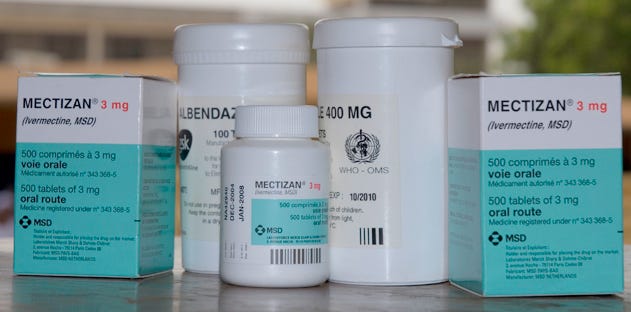
However, there’s a crucial distinction here: does ivermectin truly decrease or “cure” inflammation, or does it merely address the parasitic load in the body, which happens to be contributing to the inflammatory response? If parasites are acting as "clean-up" agents in a toxic environment—feeding on toxins, dead cells, and waste products—then their removal might temporarily alleviate inflammation simply because the body no longer has to deal with the burden of hosting these organisms.

In fact, the reduction in inflammation after ivermectin treatment could be a side effect of killing off parasites that are no longer contributing to the inflammatory process. This doesn't necessarily indicate that the body is healthier or that the root causes of inflammation (like toxins or immune dysfunction) have been addressed.

It may simply be that the body’s inflammatory response is lessened once the parasite load is reduced, but the underlying issues—such as environmental toxins, an unbalanced immune system, or chronic exposure to pollutants—remain. But what is the ivermectin doing to the body in the long-run? There is not publicly available long-term data from any study to conclusively state that it doesn’t have long-term harmful effects.

Parasites: Our Unlikely Freeloading Friends
What if parasites weren’t the villainous freeloaders we’ve been led to believe, but rather tiny, buzzard-like clean-up crews, helping us detox and tidy up our bodies? Some researchers suggest that certain parasites might actually help break down harmful substances or clean up dead and toxic tissue, acting as a sort of microscopic garbage collector. For example, Helminths (a type of parasitic worm) are thought to help modulate our immune system, potentially reducing inflammation in autoimmune diseases (they may even help balance the overzealous immune response that leads to conditions like Crohn's disease). Meanwhile, Trichuris trichiura (whipworms) and Ascaris (roundworms) could play a role in cleaning up the digestive system, getting rid of excess waste and helping maintain a healthy gut flora. So next time you feel itchy or have a slight stomach rumble, maybe thank your tiny freeloading roommates for doing the dirty work! Who knew parasites could be so helpful?

Cancer as Inflammation: The Crucial Link
The connection between inflammation and cancer has been well-documented in the medical literature. Chronic inflammation is asserted to be a key factor in the development of cancer. Inflammation can cause DNA damage, promote cell proliferation, and suppress immune responses—all of which create an environment conducive to cancer growth. But what if cancer is not the result of parasites directly causing inflammation, but rather an ongoing cycle of systemic inflammation triggered by deeper, systemic issues?
Chronic inflammation can arise from a variety of sources, including environmental toxins, poor diet, stress, and dysbiosis. The presence of parasites in an already inflamed body might be seen as a secondary factor—perhaps exacerbating the problem—but not the root cause. If parasites are part of a larger, toxic, or diseased ecosystem in the body, their presence may simply mirror the body’s inability to properly detoxify and heal.

By the time cancer manifests, it could be the result of years of unchecked inflammation—an inflammation that may have been contributed to by poor detoxification, a compromised immune system, and yes, possibly parasites feeding off the waste. But rather than seeing parasites as direct agents of cancer, we need to focus on the fact that cancer is inflammation gone unchecked. The toxins and metabolic waste that fuel both inflammation and parasite growth could be the true culprits.

Parasites as Symptomatic, Not Causative
In this broader picture, parasites might be mischaracterized as cancer-causing agents, when in reality, they are more likely symptomatic of a larger issue. The presence of parasites could indicate that the body is dealing with a compromised immune system, an overload of toxins, or an environment in which inflammation is already running rampant. The parasites might be present as a response to a toxic or diseased body, rather than as the direct cause of disease.
A Holistic Approach: Addressing the Root Causes of Inflammation
Instead of focusing exclusively on eliminating parasites, a more holistic approach would involve addressing the underlying sources of inflammation:
Detoxification: Supporting the liver, kidneys, and immune system to efficiently clear toxins from the body.
Immune System Support: Restoring balance in the immune system through proper nutrition, stress management, and immune-boosting practices.
Microbiome Balance: Encouraging a healthy gut flora, which plays a critical role in regulating inflammation and immune responses.
By focusing on restoring balance in the body and addressing the systemic causes of inflammation, we may find that parasites are less of a threat and more of a reflection of an unhealthy, toxic system. If parasites are indeed a symptom of a larger imbalance, then their removal might offer temporary relief, but without addressing the root causes of inflammation, the body will remain susceptible to disease and, yes, potentially cancer.

The Complex Role of Parasites, Inflammation, and Ivermectin
Parasites have been blamed for causing cancer, but the reality might be far more complex. Rather than directly causing disease, parasites may be playing a secondary role in a body already burdened by toxins, poor immune function, and chronic inflammation. The Mazzotti effect, associated with ivermectin treatment, may actually be a reaction to the toxic load released when parasites die—not an immune response to the parasites themselves.

Furthermore, ivermectin’s anti-inflammatory effects might only be a temporary alleviation of symptoms, not a solution to the root causes of inflammation. If cancer is, in essence, chronic inflammation, then focusing on the broader environmental and immune factors driving that inflammation—rather than simply targeting parasites—could offer a more scientifically-based approach to healing.

By shifting our focus from parasites as primary instigators of disease to understanding the broader systemic imbalances that create an environment conducive to both parasitic colonization and cancer, we can begin to take a more integrated approach to health, detoxification, and disease prevention.

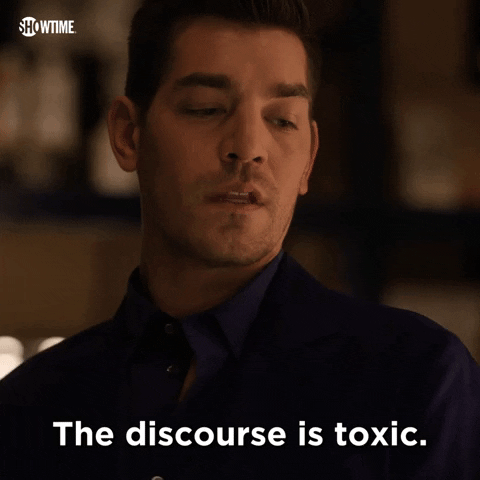



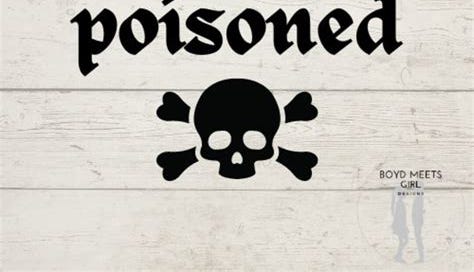


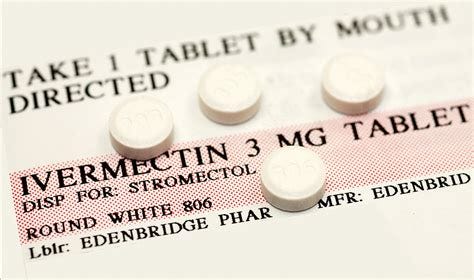






Overall, I'm highly impressed. The only bone of contention I have is referring to anything as an "immune" system. From what I can tell, We have a detox system, and if You replace where You say "immune system" with "detox system," it still makes perfect sense.
Thanks for this excellent look at the things We emerged with and the disruptors!
It’s possible that ivermectin itself is toxic - yes???